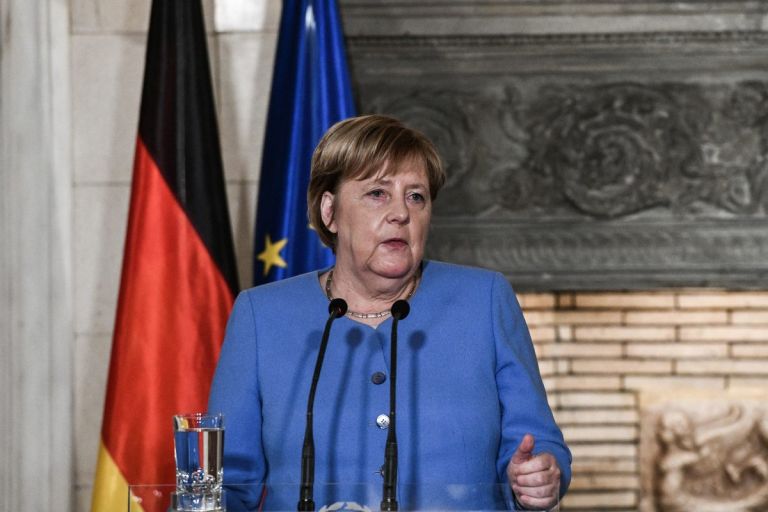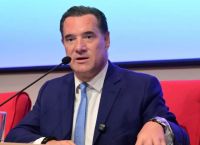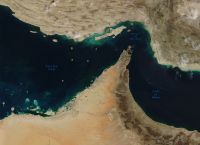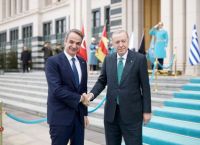Merkel: Unlike Schaeuble, I never wanted Grexit

Πηγή Φωτογραφίας: Eurokinissi (Αρχείου)//Merkel: Unlike Schaeuble, I never wanted Grexit
Former German Chancellor Angela Merkel reflected on her relationship with Greece, starting with the administration of George Papandreou in 2011, during a discussion and interview in Athens with Alexis Papahelas, director of Kathimerini, on the occasion of her recent book, Freedom.
Merkel, who played a pivotal role from 2011 when Greece entered its first bailout program until her retirement in 2021, shared critical moments and decisions in a packed hall at the Stavros Niarchos Foundation.
She emphasized, “I couldn’t imagine the EU without Greece,” clarifying that she never supported a Grexit, unlike Wolfgang Schäuble, and described Alexis Tsipras’ call to announce a referendum as “the most surprising moment of my political career.”
“I Didn’t Expect Such a Problem”
Merkel began her recount from 2011, under Papandreou’s government. “In Greece’s economic crisis, I didn’t expect our Greek partners to face such a problem. The same goes for the refugee crisis—I didn’t anticipate it would become such a shared challenge. By February 2010, it was clear the issue was significant,” she said. “I was told Greece needed money,” but she cited the EU’s “no bailout clause,” which prevented direct financial aid.
Recalling a meeting with Papandreou, she said, “I asked George, ‘What do you want?’ and he replied, ‘Nothing.’ He was silent during the meeting, while I seemed like the ‘bad guy’ saying, ‘I can’t give money.’” She noted that Herman Van Rompuy interrupted the session, drafting a statement that Greece would take necessary measures, with the EU supporting the euro as a common currency.
“Greece Faced a Very Difficult Path”
“My main question was whether Europe could manage alone. We received inaccurate data, so we didn’t know how to proceed. I knew the IMF was tough and independent. Greece had already requested IMF help, which was rejected. I knew Greece faced a very difficult path,” Merkel explained.
“There Are Hardworking and Lazy People Everywhere”
“Having studied physics, I understand numbers. I knew a few million wouldn’t suffice. As chancellor, I needed a legal basis to support the program in the German parliament. We were also concerned about banks; the situation was truly challenging. I knew there were irregularities, even by German companies in Greece. There aren’t ‘Greeks’ or ‘Germans’—there are hardworking and lazy people everywhere,” she added.
“Schäuble Wanted Greece Out”
“Schäuble argued Greece couldn’t handle exchange rate fluctuations, but I said no—we are a union, we’ve taken responsibilities, and we shouldn’t backtrack. In 2011, we had to do everything possible. If Greece were to leave the eurozone, it should be the Greek people’s decision, not ours. I was clear I didn’t want Grexit, knowing this would cause tensions with Schäuble. I kept him informed, calling every two hours during Brussels meetings,” Merkel recounted.

On Papandreou’s 2011 referendum proposal, she said, “We opposed it because we didn’t know how to handle a Greek exit. The next day, the proposal was dropped, which was the best decision. Greece needed to get on the right track.”
Merkel acknowledged her unpopularity in Greece: “I was deeply involved in Greece’s case, which was good because many issues changed—municipalities, the land registry. These weren’t pleasant, but the state needed tax revenue. I was well-informed.”
“They Called Me Crazy for Insisting on Debt Haircut”
Merkel supported Greece’s debt haircut, as did Schäuble, but Jean-Claude Trichet and Nicolas Sarkozy opposed it, fearing it would undermine confidence in the euro. “I believed Greece needed relief, but others had valid arguments. We opted for a voluntary process, which was risky. They called me ‘crazy’ for pushing it,” she said.
“I Burst into Tears”
On U.S. President Barack Obama’s mediation, Merkel admitted, “I didn’t know everything. At one point, I burst into tears under pressure.” She recalled Obama urging the ECB to provide more liquidity, but her advisors warned it wouldn’t be accepted by German courts.
“At the G20, they treated me like a ‘sick horse.’ I felt slow, unable to grasp what they were saying. Mario Draghi, as ECB president, created the ‘bazooka’ with his ‘whatever it takes’ approach, acting independently,” she noted.
“My First Meeting with Tsipras Wasn’t Impressive”
“My first encounter with Tsipras in Brussels wasn’t impressive. In Berlin, I waited outside the Chancellery, but he went to meet protesters, singing the Internationale. When he arrived, I asked what he was doing, and he smiled, saying, ‘You have to engage with your supporters.’ He wasn’t wrong,” Merkel recounted.
She described gradually building a relationship with Tsipras: “In politics, you have two opposing positions that may never align, so the art is finding common ground. Tsipras was honest, never trying to mislead me. We agreed on a process to move forward. Neither of us wanted Greece to leave the euro, though he opposed the memorandum.”
“The Most Shocking Call of My Career”
Merkel described Tsipras’ call about the referendum as “the most shocking of my political career.” When she asked for his recommendation, he said, “No.” She recalled, “I lost my voice. Hollande asked, ‘Now what?’ If it was ‘no,’ it meant Greece’s exit from the euro. A democracy can’t decide for everyone else.”
“You Are a People We Could Learn From”
Asked what she’d say to an average Greek today, Merkel replied, “I wouldn’t apologize; I’ve explained my motives. I’d say we achieved a lot. I can’t imagine the EU without Greece. I was impressed by the resilience of Greek society during the crisis. I wondered if Germans could endure the same. You are a strong, admirable people we could learn from.”
Refugee Crisis: Dramatic Situation in Greece
On the refugee crisis, Merkel said, “I knew we had to act and talk with Europe’s neighbors.” She supported the EU-Turkey deal, noting Greece’s dramatic situation. “Illegal migrants had to be returned. Turkey received funds in return. Politics requires realism—I spoke with Erdoğan and don’t regret it.”
On Trump and Global Relations
On Donald Trump, Merkel said, “He was elected by the American people; we respect that. He thinks in terms of deals, but the world doesn’t work that way. In the EU, we compromise. Trump wasn’t aggressive toward me but always sought attention. In the Oval Office, he refused a handshake when I asked. If tariffs raise costs for Americans, it will impact him. As Europeans, we must stay united and negotiate.”
She added, “NATO’s defense spending increase benefits our security. However, when Vice President Vance says support depends on agreeing with their view of freedom—without rules or checks—that’s a threat to democracy. Ukraine must remain sovereign, and Trump’s push for movement there is correct. Europe must support its welfare state but avoid unlimited debt.”
Διαβάστε όλες τις τελευταίες Ειδήσεις από την Ελλάδα και τον Κόσμο






Το σχόλιο σας